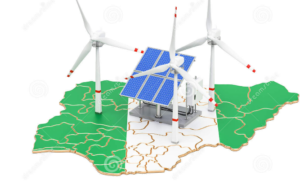Nigeria’s Energy Poverty Sustained by Hypocritical Green Lobby
By Vijay Jayaraj – July 27, 2022
It is a busy Wednesday morning in Nigeria as business folk are forced to choose between trying to operate without electricity or buying expensive — and increasingly scarce — gasoline to power backup generators. Poor households have no choice because they cannot afford generators.
Such is the situation in one of Africa’s largest and fastest growing economies. Months-long fuel shortages and frequent power blackouts due to grid failure have created persistent energy poverty.
Addressing this problem is especially difficult when Western climate elites pressure the country to favor renewable energy over more affordable and reliable fossil fuels.
However, Nigerians are becoming more inclined to question this carbon colonialism since Europe asked Africa to supply natural gas for European homes while encouraging Africans to reject the same fuel. This blatant hypocrisy apparently is blind to the plight of those starved for life-sustaining coal, oil and natural gas.
Nearly half of Nigeria’s 85 million people live without grid electricity. The remaining have access only to highly unreliable power sources — nowhere near the standards of the developed West.
Blackouts are unpredictable even in the country’s capital of Abuja. Derrick Nuhu, a resident in the city’s AMAC region, says that the power cuts range from 15 minutes to 15 hours and that households are finding it difficult to store food for long.
“We have installed solar energy to assist but with great cost,” he says. “But it is not reliable. For example, solar can power a refrigerator only when the weather is favorable. We are in the rainy season now, so it usually doesn’t support the freezer and refrigerator.”
Last week, there was a nationwide blackout as the grid “collapsed to zero megawatts in less than three hours,” according to the Nation. Nationwide blackouts like these have become a regular event, with hundreds of regional blackouts on an everyday basis.
Solving this crisis is not a straightforward task. The effort to increase the grid’s reliability is in disarray thanks to the government’s renewable energy priorities. Nigeria’s administration faces constant pressure from the West to reduce consumption of fossil fuels, which are the only sources of energy that can provide reliability and affordability in the short run.
For example, the city of Lagos has announced that it will reduce burning of fossil fuels. Lagos is “among the top ten of the world’s fastest-growing cities and urban areas.” Its gross domestic product is in Africa’s top five. Any reduction in the use of fossil fuels will adversely affect the economy.
The Nigerian government is also being “funded” by the European Union (EU) and German government to develop unreliable and expensive off-grid renewable energy projects. Speaking at a promotional event, representatives from both Germany and the EU refused to address ongoing grid problems in Nigeria. Instead they were keen on foisting onto Nigerians wasteful solar projects.
Bloomberg’s Margaret Sutherlin writes, “While African leaders are eager for the millions in revenue that the gas deals are likely to bring in, they’re also calling out the sudden interest in their resources as a double standard. They question why the West insists Africa move away from dirty fuels — thereby delaying access for hundreds of millions of people to electricity — even as its gas is used to keep the lights on in Europe.”
Nigerian President Muhammadu Buhari, who has been largely pro-green, ironically urged “London and Brussels to open ‘green’ wallets for a 7,000-kilometer Nigeria-Morocco scheme that aims to send gas to Europe,” according to reports.
Regardless of whether Nigerians supply gas to Europe or not, they must stand for their energy rights. No Western political institution should determine energy access in the daily lives of Nigerians. As for the West, it is time for people of conscience to take a stand against the colonialism that green lobbyists seek to impose on billions of lives across the world.

Originally published here at Human Events on 27 July 2022.
Vijay Jayaraj is a Research Associate at the CO2 Coalition who holds a holds an MS in Environmental Sciences from University of East Anglia (UK) and a BS in Engineering from Anna University (India). He is a prolific writer, based in Bengaluru India, who has been published about CO2 benefits, energy and climate science, most often from the viewpoint of the developing world.

